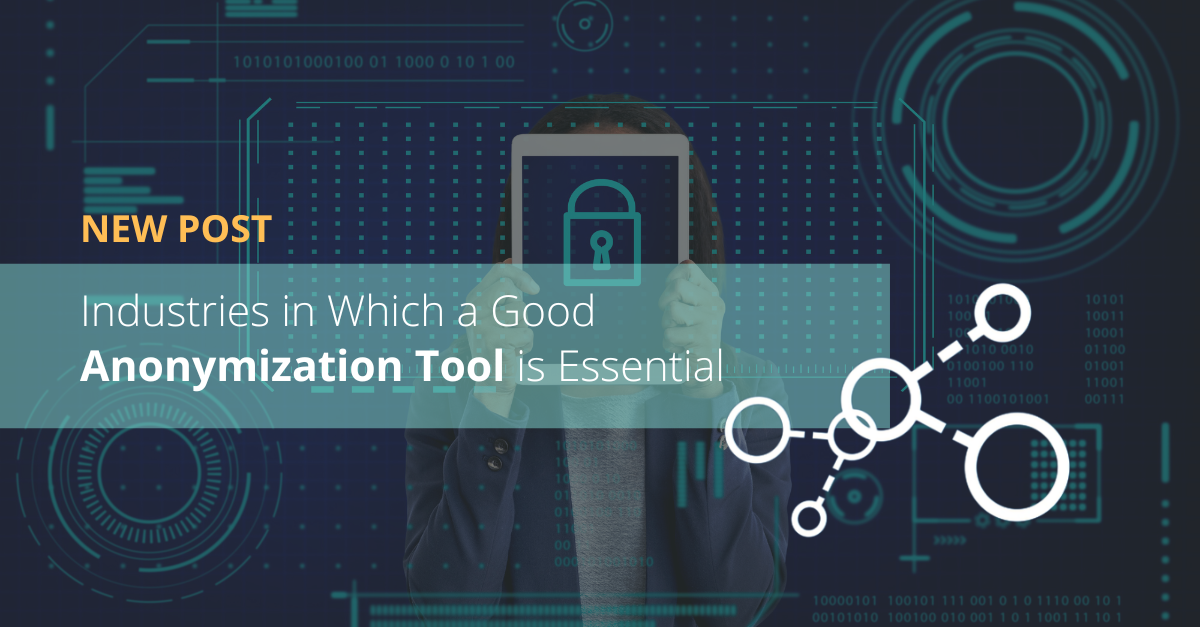Using a good data anonymization tool is crucial for protecting confidential data while preserving the reliability of the data that are collected and subjected to the various de-identification techniques.
This kind of tool was developed and continues to be improved based on natural language processing and machine learning, meaning it goes through continuous optimization.
But what does an anonymization tool do? And, in which industries do these tools need to be used?
What is an anonymization tool?
An anonymization tool is a computer application or software based on machine learning algorithms that performs the function of removing all personal identifiers from a certain data set, stripping it of all confidential and private information.
These algorithms can identify each type of data, modify them to the extent required, and group them in such a way as to guarantee completely irreversible anonymization.
Anonymization software must be able to alter, mask, exchange or generalize certain key values of personal data, eliminating the possibility of revealing the data subject's identity and being reverse engineered.
Why are anonymization tools necessary?
For every company and organization, using an anonymization tool is a way to comply with European legal standards for the protection of personal data, such as the GDPR. But it is also a strategy that offers a number of other advantages.
Data anonymization software is necessary tool because it:
- Allows companies to share information within the organization or with third parties without violating data confidentiality, and in line with the legal framework.
- Provides organizations with a higher level of data security. In the event of information theft through cyberattacks, anonymized information will be worthless to the hacker.
- Helps public administrations to comply with the principle of transparency, as it allows institutions to share information without the possibility of the data subjects being identified.
- Allows advanced data analytics to be carried out.
- Helps to generate and maintain trust in the organization or company, thanks to the guaranteed confidentiality and security in the processing of customer data.
- Increases data governance.
Related content: Why is data anonymization important? | Pangeanic
Industries in which anonymization is needed
Anonymization tools are key in industries where personal data is managed and stored, requiring a high level of security. For example:
- The legal field: Anonymization is essential when sharing judgements and other legal documents.
- Commercial industries: For deleting personal customer data in business documents, such as invoices, when the company's legal access to the data has expired.
- Banking and finance: Personal data that identify individuals or activity logs are removed in order to perform analysis and extract trends according to the types of customers.
- Healthcare: To protect private and confidential data in patients' medical history, clinical analysis results, etc., in order to share them with other health centers or other medical professionals for analysis. This complies with the Health Insurance Portability and Accountability Act.
- Industries that deal with security systems: Information captured by software applications that track and control fingerprints or other biometric information must be protected.
- Research sectors from any field: To guarantee the confidentiality of personal information and to allow its use in analysis, studies and statistics in the name of research and development.
- Public administrations and social institutions: Allowing them to share information with other public bodies, which is essential for the fulfillment of their functions.
- In the cloud: Any industry where digitized information must be processed and stored in the cloud.
- Marketing and communication: In order to analyze customer and audience data sets without having access to personal data, such as names or accounts.
Types of documents that can be anonymized
Regardless of the volume of information, companies or organizations must know how to properly manage and anonymize any document containing personal data or confidential and sensitive information.
Whether these documents are in the cloud or in a local database, anonymizing them is essential in order to comply with the General Data Protection Regulation (GDPR) and to preserve the organization's security.
For example, documents that should be anonymized include:
- Court rulings.
- Scientific research reports.
- Medical records.
- Commercial documents containing customers' personal data.
- Documents or databases that store information from biometric control systems.
- Financial trends.
- Documents or databases containing health records from medical institutions or public agencies.
These documents can be in various formats: .docx or .doc (Word), .txt (text), .PDF (portable document format), .pptx (PowerPoint), etc. It all depends on the tool being used.
The importance of a trusted anonymization tool
Using a trusted anonymization tool means the company or organization benefits by guaranteeing privacy and ensuring that data does not lose its value. In addition, it ensures compliance with legal regulations.
Good data anonymization software will have its algorithmic model adjusted according to the organization's needs. This will provide the necessary privacy and protection to the users' or customers' private data and, at the same time, ensure that the resulting information is still functional.
At Pangeanic, we have developed data anonymization services using techniques based on artificial intelligence and that fully comply with the European Union's GDPR. Contact us and we will offer you a customized solution according to your interests.




